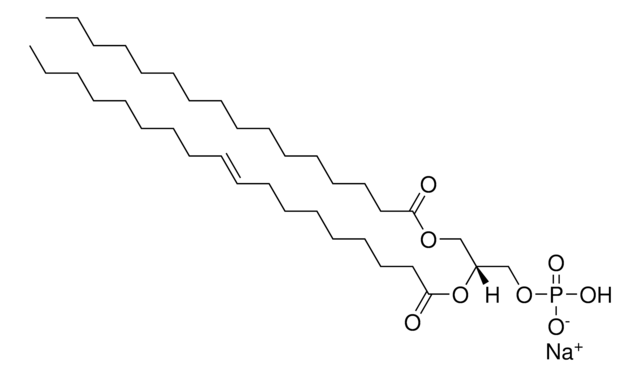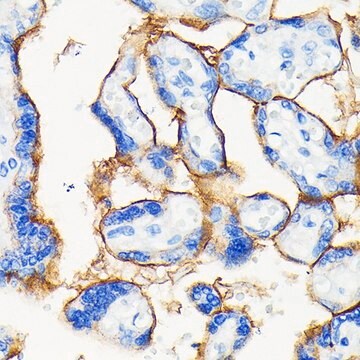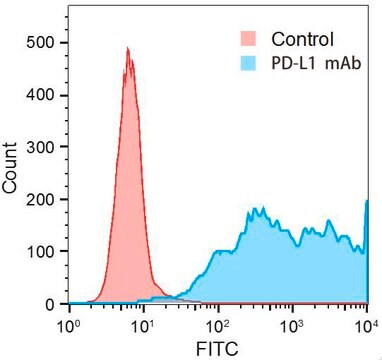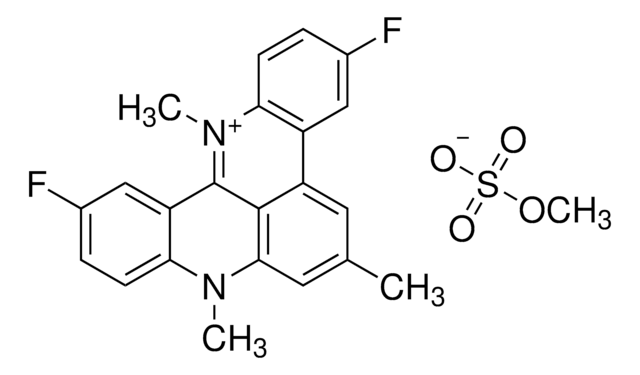HTS089M
ChemiSCREEN Membrane Preparation Recombinant Human LPA1 Lysophospholipid Receptor
Human LPA1 / EDG2 GPCR membrane preparation for GTPγS binding Assays.
Se connecterpour consulter vos tarifs contractuels et ceux de votre entreprise/organisme
About This Item
Code UNSPSC :
41106514
eCl@ss :
32161000
Nomenclature NACRES :
NA.84
Produits recommandés
Description générale
Human EDG2 encoding LPA1
Lysophosphatidic acid (LPA) is a lysophospholipid produced by activated platelets that inhibits adenylate cyclase and stimulates DNA synthesis, changes in cell morphology, and increases in intracellular calcium in a variety of cultured mammalian cells. A family of three GPCRs, LPA1, LPA2 and LPA3, mediates the biological effects of LPA (Contos et al., 2000). LPA1 is widely expressed, with particularly notable expression in the ventricular zone of the embryonic cerebral cortex. Mice lacking LPA1 exhibit craniofacial abnormalities and defective development of the cerebral cortex (Harrison et al., 2003; Choi et al., 2008). LPA1 also promotes fibrotic responses to tissue injury (Tager et al., 2008)
Millipore′s LPA1 Membrane Preparation is a crude membrane preparation made from the proprietary stable recombinant cell line that is also used for Millipore’s LPA1 Calcium Optimized Cell Line (HTS089C). This LPA1 Membrane Preparation exhibits both constitutive and agonist-induced activity in GTPγS binding assays; thus it is an ideal HTS tool for screening of compounds for agonist, inverse agonist, and antagonist activities. The membrane preparations exhibits EC50 of 73 nM for LPA in a GTPγS binding assay.
Millipore′s LPA1 Membrane Preparation is a crude membrane preparation made from the proprietary stable recombinant cell line that is also used for Millipore’s LPA1 Calcium Optimized Cell Line (HTS089C). This LPA1 Membrane Preparation exhibits both constitutive and agonist-induced activity in GTPγS binding assays; thus it is an ideal HTS tool for screening of compounds for agonist, inverse agonist, and antagonist activities. The membrane preparations exhibits EC50 of 73 nM for LPA in a GTPγS binding assay.
Application
GTPγS binding assay
Actions biochimiques/physiologiques
GPCR Class: A
Protein Target: LPA1 / EDG2
Target Sub-Family: Lysophospholipid
Qualité
1 unit = 5 μg
EC50 in GTPγS binding assay by LPA: ~ 73 nM
EC50 in GTPγS binding assay by LPA: ~ 73 nM
Caractéristiques
Inucbation Conditions
GTPγS ASSAY CONDITIONS: Membranes are permeabilized by addition of saponin to an equal concentration by mass, then mixed with [35S]-GTPγS (final concentration of 0.3 nM) in 20 mM HEPES, pH 7.4/100 mM NaCl/10 mM MgCl2/10 μM GDP in a nonbinding 96-well plate. Unlabeled ligand was added to the final concentration indicated in Figure 1 (final volume 100 μL), and incubated for 30 min at 30°C. The binding reaction is transferred to an FB filter plate (Millipore MAHF B1H) previously prewetted with water. The plate is washed 3 times (1 mL per well per wash) with cold 10 mM sodium phosphate, pH 7.4, then dried and counted.
GTPγS ASSAY CONDITIONS: Membranes are permeabilized by addition of saponin to an equal concentration by mass, then mixed with [35S]-GTPγS (final concentration of 0.3 nM) in 20 mM HEPES, pH 7.4/100 mM NaCl/10 mM MgCl2/10 μM GDP in a nonbinding 96-well plate. Unlabeled ligand was added to the final concentration indicated in Figure 1 (final volume 100 μL), and incubated for 30 min at 30°C. The binding reaction is transferred to an FB filter plate (Millipore MAHF B1H) previously prewetted with water. The plate is washed 3 times (1 mL per well per wash) with cold 10 mM sodium phosphate, pH 7.4, then dried and counted.
Forme physique
One package contains enough membranes for at least 200 assays (units), where one unit is the amount of membrane that will yield greater than 1000 cpm specific LPA-stimulated [35S]-GTPγS binding.
Liquid in packaging buffer: 50 mM Tris pH 7.4, 10% glycerol and 1% BSA with no preservatives.
Packaging method: Membrane protein was adjusted to the indicated concentration in packaging buffer, rapidly frozen, and stored at -80°C.
Liquid in packaging buffer: 50 mM Tris pH 7.4, 10% glycerol and 1% BSA with no preservatives.
Packaging method: Membrane protein was adjusted to the indicated concentration in packaging buffer, rapidly frozen, and stored at -80°C.
Stockage et stabilité
Store at –70°C. Product is stable for at least 6 months from the date of receipt when stored as directed. Do not freeze and thaw.
Informations légales
CHEMICON is a registered trademark of Merck KGaA, Darmstadt, Germany
Clause de non-responsabilité
Unless otherwise stated in our catalog or other company documentation accompanying the product(s), our products are intended for research use only and are not to be used for any other purpose, which includes but is not limited to, unauthorized commercial uses, in vitro diagnostic uses, ex vivo or in vivo therapeutic uses or any type of consumption or application to humans or animals.
Code de la classe de stockage
12 - Non Combustible Liquids
Classe de danger pour l'eau (WGK)
WGK 2
Point d'éclair (°F)
Not applicable
Point d'éclair (°C)
Not applicable
Certificats d'analyse (COA)
Recherchez un Certificats d'analyse (COA) en saisissant le numéro de lot du produit. Les numéros de lot figurent sur l'étiquette du produit après les mots "Lot" ou "Batch".
Déjà en possession de ce produit ?
Retrouvez la documentation relative aux produits que vous avez récemment achetés dans la Bibliothèque de documents.
Notre équipe de scientifiques dispose d'une expérience dans tous les secteurs de la recherche, notamment en sciences de la vie, science des matériaux, synthèse chimique, chromatographie, analyse et dans de nombreux autres domaines..
Contacter notre Service technique








